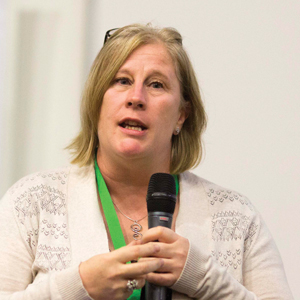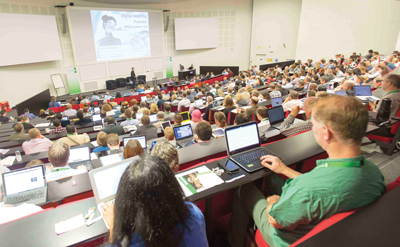A new group for FE practitioners aimed at helping them “meet the spirit” of the Further Education Learning Technology Action Group (Feltag) was launched at this year’s Association for Learning Technology (ALT) conference.
The Feltag Special Interest Group is a forum for teachers, lecturers, learning technologists and others working directly with learners, to discuss the challenges and areas of change in relation to the use of learning technology.

It was developed by ALT to help FE staff working directly with learners to take forward the Feltag agenda and share what was happening across the sector.
“When Feltag came along, there was a lot of work being done at a higher level — at a strategic level — looking at it from an agency perspective, from a senior management perspective,” said James Clay, Jisc project manager and one of the founding members of the group.
“One of the things we felt as a committee was that the practitioners are almost being left out.
“There’s an assumption sometimes that these practitioners, these teachers and lecturers, will go off and just be able to do it. And actually, no, they need guidance, they need advice and they need support.
“And often that advice, guidance and support is best coming from peers and colleagues.
“There are a lot of young lecturers and young teachers out there who’ve got amazing ideas but who aren’t quite sure how to share them.

“This is about giving them an open platform that’s easy to access and easy to use, to work with others in order to share those ideas, and for other individuals and institutions to exploit those ideas in order to help meet the spirit of Feltag.”
The group was developed learning technology experts in the FE sector and, in addition to Mr Clay, the other founding members were Rachel Challen, eLearning manager at Loughborough College, Peter Kilcoyne, ILT director at Heart of Worcestershire College, Geoff Rebbeck, e-Learning adviser and Ellen Lessner, e-Learning consultant.
The group is open to all practitioners interested in promoting Feltag themes and wanting to share their ideas.
It aims to provide an opportunity to share and collaborate, and to learn from others how to use technologies to enhance learning and to improve outcomes for learners.
Mr Clay said: “It’s about how can we use it to engage learners, to widen participation, for inclusion and accessibility, and also to get teachers and lecturers to understand it’s not something that’s an extra, a bolt-on.

“We talk about the fear of technology, it’s often about the fear of change, but often these technologies are there to enable change, it’s there to make things better for learners, to make things better for learners, easier for staff and better for staff.”
The group was designed to work alongside Feltag and its work is expected to tie in to what’s happening at a higher level.
“We expect that to feed down into the group and enable us to know if we need to change direction or focus,” said Mr Clay.
“But likewise, what we also hope is that if we get enough people involved we’ll also be able to push things back up to say, real change is happening we’ve got people sharing, we’ve got people collaborating and changing the way that they work, and they’re using learning technology more effectively and efficiently to improve learning outcomes.”
In addition to a mailing list and Twitter, the group will host events and webinars to showcase the work of its members.
Members are also encouraged to use technology to develop ways to share their own ideas, such as creating YouTube channels or using instant messaging tools such as Yammer or Slack.
Email FELTAGSIG@jiscmail.ac.uk to join the group’s mailing list.
Main pic: James Clay
Pics by: Chris Bull
ALT conference — working together and supporting staff
The theme of the 2015 Association for Learning Technology conference was shaping the future of learning together.
The three-day event was held in Manchester from September 8 and from an FE and skills sector perspective there was a focus on working together to support staff, and to give them the skills they need to use technology effectively.
Diana Laurillard, Rachel Challen and Neil Morris presented Blended Learning Essentials, a new open course available through Future Learn for practitioners in the vocational education and training sector.
“One of the great difficulties for the teaching practitioner, whether they’re working in skills-based learning, adult and community learning or FE college, is they all are expected somehow to embrace new technologies while also doing the day job,” said Ms Laurillard.
“The idea of the course was to make it feasible for anyone in the sector who wants to feel they know what it’s about to get in touch with it and get some experience of it, and feel supported in that process.”
The course, which is split into two parts, introduces some of the tools that are available and how to use them, as well as how to embed what they’ve learned into practice. It’s designed so that participants can learn from each other, through case studies and by sharing their own experiences of what’s worked and what hasn’t.
The aim is that it will create a sustainable community, in which participants can continue to share and collaborate after the course is finished.
“If you’ve registered in the course, you can get back to it. That means that you can stay in those groups, you can stay arguing that point, you can stay talking to other colleagues and peers about what is the best way to go about this,” said Ms Laurillard.
“That’s how any area builds its knowledge. And it keeps everything renewed, because the technologies keep changing. It’s never going to go away.”
A different approach to supporting staff was presented by Sussex Downs College, in a talk on engaging learners in an active dialogue around their digital expectation and experiences.
Through its Student Digital Leaders project, the college has brought in its learners to evaluate what the college is doing, and to help them to think differently and realise opportunities they may be missing. Learners have also worked one-to-one with staff to teach them to use the technology.
Project manager John Webber said: “It’s really vital to the next phase in developing new technology. We’ve got limited resources and limited time, so we need to be using the best intelligence we can in developing what we’re doing and these young students and the other that will work with us across the college will be vital in helping us steer that.”







Feltag is a movement not a report…..Great stuff…..I am in 🙂
It is great to see lots more practitioners joining the mailing list as a result of this article.